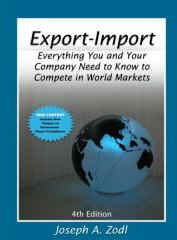
Choosing a Freight Forwarder
by
Joseph Zodl
© 2000 Joseph Zodl
(excerpted from remarks to USEAC Director's Meeting, sponsored by
the United States Department of Commerce, Scottsdale, Arizona, November 28, 2000)
A freight forwarder is often called a "travel agent for freight" but is actually more than that. A freight forwarder can assist the exporter (seller) with documentation, freight rate negotiation, and export compliance.
It is important to note right from the very beginning that the seller, who in most cases is the U.S. Principal Party in Interest (USPPI), cannot delegate his responsibility for export compliance to the freight forwarder or any other party. So while the forwarder can be of assistance, it is important that the seller knows that he accepts the responsibility by selling for export. This is made quite clear in appropriate section of the Export Administration Regulations (15 CFR 758.1).
Under deregulation, a freight forwarder does not need to be licensed to handle air freight shipments. The Federal Aviation Administration monitors forwarders as well as shippers in such areas as hazardous materials, however. But there is actually nothing stopping anyone from renting an office near a major airport tomorrow morning and opening up as an air freight forwarder.
A good choice for an exporter is to select an air freight forwarder who has IATA International Air Transport Association) certification. This is not a government license, but is a certificate from the airlines' own association that the forwarder has met their own requirements. If a forwarder has IATA certification, this is usually shown on their business cards and literature.
An ocean freight forwarder should display a license from the Federal Maritime Commission. This is often abbreviated on business cards and literature (FMC #9999).
Even if a seller believes that they will only have air, or only have ocean shipments, I recommend they select a forwarder who has can handle both functions. An ocean shipper can suddenly have a rush air shipment of a spare part; an air shipper can ultimately receive a large bulk order that will best go ocean. I recommend that the seller use a freight forwarder who is both IATA-certified and FMC-licensed.
For land shipments to Canada and Mexico, any forwarder can work with a seller on arranging documentation and coordination of cargo. However, most large truckload (TL) and less-than-truckload (LTL) carriers have their own connections into our NAFTA partners and a forwarder is usually not necessary if the seller can handle the paperwork end.
Let's talk about one more player in the transaction: the customs broker. A customs broker is licensed by the U.S. Customs Service to "transact customs business on behalf of others (19 CFR 111.1)."` The licensing procedure involves passing a tough test on Customs regulations and duty rates, and also a character investigation by U.S. Customs. Corporations with an officer who is a licensed broker may conduct business as customs brokers.
Most sellers will eventually become buyers, too. The foreign buyer will approach the U.S. seller with his own catalog, or a U.S. seller may ask his foreign distributor to help him find a new product for the U.S. market. Having a customs broker available is important.
If a U.S. exporter is the client of a freight forwarder who is IATA-certified and FMC-licensed and who also provides customs broker services, it usually works out better. Both air and ocean services are available from a company. They are available from a company that has important selling points on its resume. The company can provide assistance on ground shipments when needed, and can arrange customs clearance on imports.
As a side note, some freight forwarders operate in many cities and do not offer customs brokerage in each city. For example, a company may offer forwarding services from offices in Los Angeles, Sacramento, and San Francisco, but offer customs brokerage services only in Los Angeles and San Francisco. They can, however, clear incoming shipments in those cities and then move them on to final destination. The local office in Sacramento or San Diego will still provide local customer service.
Many firms also offer on-line tracking and tracing, and other services for customers.
Lastly, what I have said about licensing is not uniform internationally. A freight forwarder or customs broker in another country might have quite different licensing requirements, or none at all. IATA-certification is available internationally for qualified air freight forwarders.

|
||